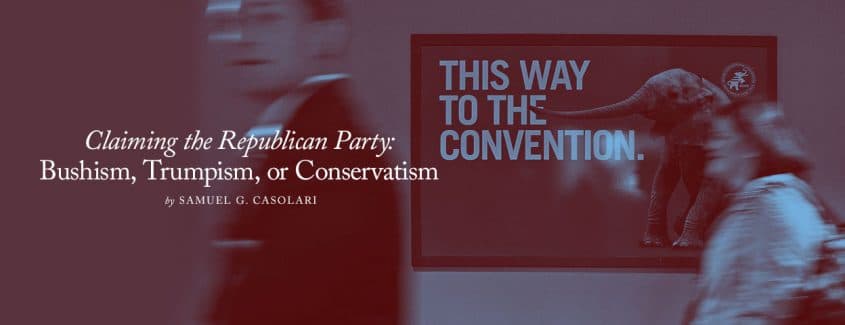
The 2016 Republican presidential nomination is a collision course of competing political and cultural views of America. The nomination is a ferocious war among different cultural, economic, and philosophical forces attempting to lay claim over the Republican Party, and South Carolina is now the latest battle. These forces are: Bushism, Trumpism, and conservatism.
Bushism represents those business-friendly Republicans who generally favor international trade agreements, comprehensive immigration reform, a vigorous foreign and defense policy, an active government that supports business interests and traditional entitlement programs and a cautious approach to conservative innovation and reform. Bushism symbolically appeals to traditional conservative positions, but tends to qualify these positions with notions of electability. Thus, George H. W. Bush appealed to a kinder and gentler county; George W. Bush wrapped his conservative arguments in compassion, and Jeb Bush talks of a right to rise. Bushism is the antithesis of populism and finds its greatest support among traditional-establishment political, business, and Wall Street interests. It loves to make deals and side-deals. As a popular political force, it is in decline and its message seems weak. Its donor class is oblivious to this political decline. They invested over $100 million in Jeb Bush, only for him to perform poorly in Iowa and New Hampshire.
Trumpism is a populist movement of the disaffected and disadvantaged, many of whom are inclined to a cultural conservatism and national patriotism. They are economically insecure, distrustful of elites, politically voluble, and generally working class. They are hostile to political correctness, establishment etiquette, the bi-coastal elites, and the media. Unlike the philosophy of Bushism, they are opposed to comprehensive immigration reform, guest-worker programs, bad trade deals, and international corporations that export jobs and plants abroad. They don’t like nation building. Unlike Bushism, which finds its home in the Republican Party, these voters can migrate from one party and personality to another. In southern Ohio, for example, from Steubenville to the eastern suburbs of Cincinnati, these voters alternated from Jimmy Carter to Ronald Reagan to Ross Perot to Bill Clinton and even George W. Bush. In Donald Trump they find a champion that they could not find in Barack Obama, John McCain, and Mitt Romney. They are energized by strength.
The final force is the divided force of conservatism. It includes advocates of limited government, free enterprise, restrained foreign intervention, a strong defense, and a fidelity to traditional values of family, community, and faith. Since 1988, national conservatism has been sliced and diced among its various parts without a credible and coherent set of leaders and principles. Thus conservatism has been divided among libertarians, neo-cons, paleo-cons, and social conservatives. Conservatism can express itself in popular and national success such as in 1994, 2010, and 2014-15, but has so far failed to win a national presidential election. In some instances, conservatism has lost its appeal due to accommodation with Bushism and the establishment, while at the same time could find natural alliances with the Trumpian forces.
These three forces are now competing for the control and direction of the Republican Party. It is no wonder that the Republican primary has become a bitter and personal campaign. The personal and economic grievances of the Trumpistas, the last gasp of the establishment, and the division among conservatives is the perfect storm for a weak and wounded Republican nominee for president. The campaign has worsened the relationship among these forces, and has raised the prospect that none of these forces could come together in a consensus. While it is true that many voters aligned with Donald Trump stayed home when McCain and Romney were the Republican nominees, it may be equally true that many movement conservatives will stay home if Donald Trump is the nominee.
Perhaps the South Carolina primary might clarify the direction of the campaign. A victory by Donald Trump will make it hard for the divided conservatives and the declining establishment to provide an alternative. Conservatism, as we understand it as a political and social philosophy, is on the line in the Palmetto State, and may not recover its national importance for years to come.



